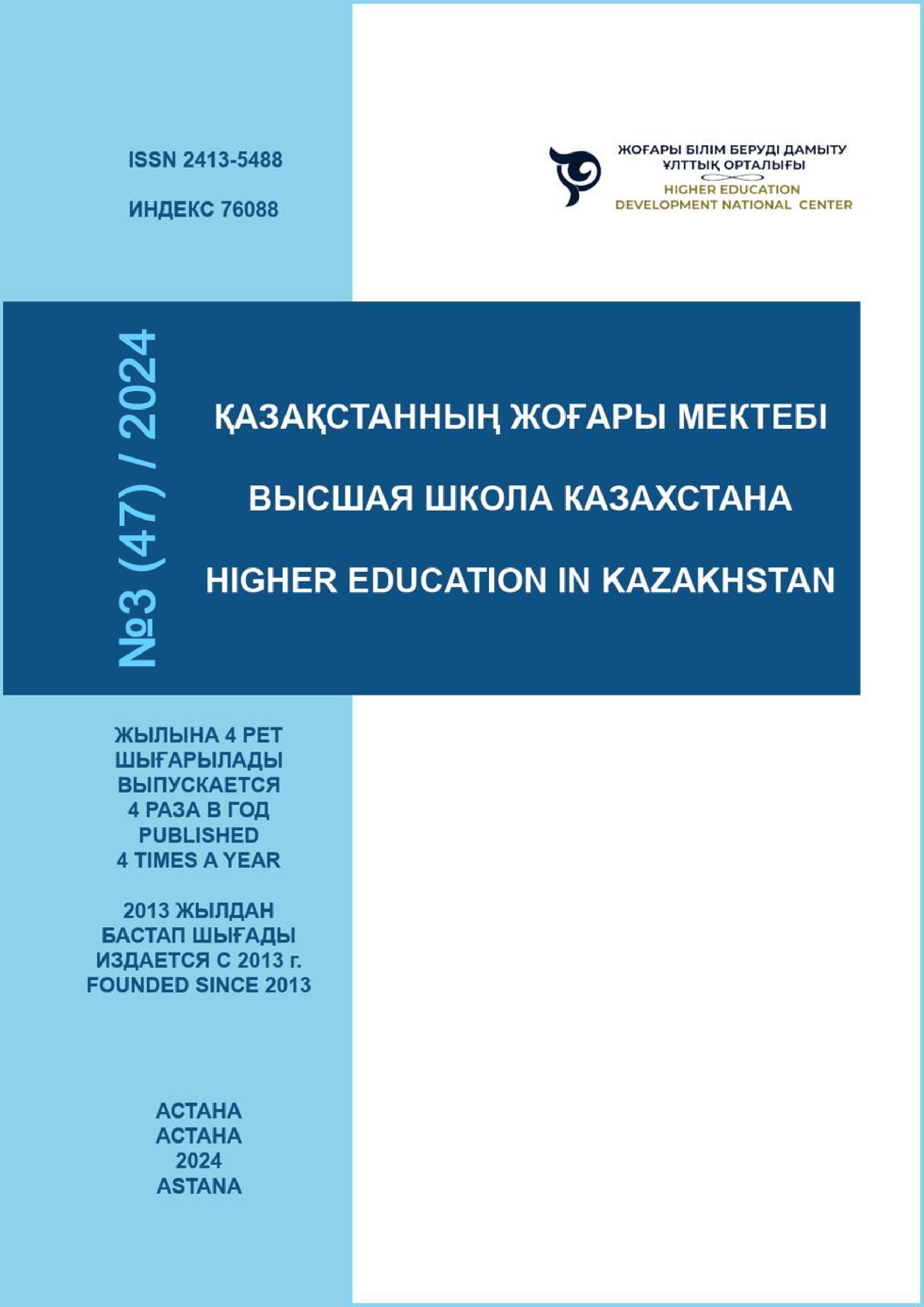DIAGNOSIS OF CAREER READINESS AMONG SENIOR UNDERGRADUATES AND GRADUATE STUDENTS: DIAGNOSTIC TOOLS, RESULTS OF CONFIRMATORY EXPERIMENT
DOI:
https://doi.org/10.59787/2413-5488-2024-47-3-154-165Кілт сөздер:
career choice, university students’ career development, career decision-making, career readiness, higher education, psychological and educational support, undergraduate and graduate education.Аңдатпа
This study delves into the intricate landscape of career decision-making, transcending the conventional job selection paradigm to encompass a holistic understanding of oneself, an awareness of potential vocations, and insights into developmental trajectories. Conducted at Toraighyrov University in the Kazakhstan, the research engaged 310 participants, comprising 215 undergraduates and 95 graduate students. Spanning humanities and STEM fields. Key findings emphasize the critical need for tailored interventions, including a specialized career course targeting information utilization skills and self-awareness. The proposed enhancement of one-on-one career counseling sessions aims to empower students with lifelong skills for effective self-management. Employing the Career Decision-making Difficulties Questionnaire (and the Six Phases of Career Decision-making Questionnaire, the study delineates the six phases of career decision-making, shedding light on significant challenges that serve as prognostic indicators of career readiness motivation. A noteworthy finding reveals that 43% of fourth-year undergraduates and 47% of graduate students are positioned in the pivotal fourth phase, representing a fundamental competency for those embarking on their professional journeys. Furthermore, the study underscores the rarity of achieving the sixth phase, symbolizing a fully determined career choice, with only 15% of graduate-level respondents and 7% of undergraduates reaching this advanced level of decision-making prowess
Әдебиеттер тізімі
Amir, T., Gati, I. & Kleiman, T. (2020). Understanding and interpreting career decision-making difficulties. Journal of Career Assessment, 16, (3), 281-309. https://doi.org/10.1177/1069072708317367.
Brown, S., Lent, R. (2012). Career development and counseling: Putting theory and research to work. 2nd Ed. Hoboken: Wiley & Sons.
De Vos, A., Jacobs, S., & Verbruggen, M. (2021). Career transitions and employability. Journal of Vocational Behavior, 126, 103475. https://doi.org/10.1016/j.jvb.2020.103475
Gati, I. &Tal, S. (2022). Decision-Making Models and Career Guidance. International Handbook of Career Guidance. Dordrecht: Springer. https://doi-org.libproxy2.usc.edu/10.1007/978-1-4020-6230-8_8.
Gati, I., & Kulcsár, V. (2021). Making better career decisions: From challenges to opportunities. Journal of Vocational Behavior, 126, 103545. https://doi.org/10.1016/j.jvb.2021.103545
Gati, I., Gadassi, R. & Mashiah-Cohen, R. (2012). Career decision-making profiles vs. styles: Convergent and incremental validity. Journal of Vocational Behavior, 81, 1, 2–16. https://doi.org/10.1016/J.JVB.2012.03.004.
Germeijs, V. & Verschueren, K. (2006). High school students’ career decision-making process: Development and validation of the Study Choice Task Inventory. Journal of Career Assessment,14, 449–471.
Hirschi, A. & Läge D. (2017). The relation of secondary students’ career choice readiness to a six-phase model of career decision-making. Journal of Career Development, 34, 164–191. https://doi.org/10.1177/0894845307307473.
Hirschi, A. (2012). Vocational identity trajectories: Differences in personality and development of well-being. European Journal of Personality, 26, (1), 2–12. https://doi.org/10.1002/per.812.
Jepson A. & Dickson, L.(2011). Continuity in Life-Span Career Development: Career Exploration as a Precursor to Career Establishment. The Career Development Quarterly. 51, No. 3, 217-233. https://doi.org/10.1002/j.2161-0045.2003.tb00603.x.
Kulcsár, V., Dobrean, A.& Gati,I. (2020). Challenges and difficulties in career decision making: Their causes, and their effects on the process and the decision. Journal of Vocational Behavior, 116,103346. https://doi-org.libproxy1.usc.edu/10.1016/j.jvb.2019.103346.
Minister of Labor and Social Protection of the Republic of Kazakhstan (2012). On approval of the National Qualifications Framework. Joint Order of the Minister of Labor and Social Protection of the Republic of Kazakhstan from September 24, 2012 № 373-ө-m and the Minister of Education and Science of the Republic of Kazakhstan from September 28, 2012 № 444. https://adilet.zan.kz/rus/docs/V1200008022
Patton, M. Q. (2002). Qualitative research and evaluation methods. 3rd ed. Thousands Oaks, CA: Sage Publications.
Rochat, S. (2019). The Career Decision-Making Difficulties Questionnaire: A case for Item-Level Interpretation. The Career Development Quarterly, 67 (3), 205–219. https://doi.org/10.1002/cdq.12191.
Sampson, J. Jr, Reardon, R., Peterson, G. & Lenz J. (2004). Career counseling and services: A cognitive information processing approach. Pacific Grove, CA: Brooks/Cole.
Sampson, J., Hou, P.-C., Kronholz J., Dozier, V., McCain, M.&Buzzetta, M. (2014). A content analysis of career development theory, research and practice. The Career Development Quarterly, 62, 290–326.
Super, D. (2021). A life-span, life-space approach to career development. Career choice and development. 2nd ed, 197–261.
Taylor, E., Siegele, J., Smith, A. & Hardin, R. (2018). Applying Career Construction Theory to Female National Collegiate Athletic Association Division I Conference Commissioners. Journal of Sport Management. 32 (4), 321–333. https://journals.humankinetics.com/view/journals/jsm/32/4/article-p321.xml.
Van Esbroeck, R., Tibos, K. & Zaman, M. (2005). A Dynamic Model of Career Choice Development. International Journal for Educational and Vocational Guidance, 5 (1), 5–18. https://doi.org/10.1007/s10775-005-2122-7.
Wright, S., Jenkins-Guarnier,i M. & Murdock, J. (2019). Career development among first-year college students: College self-efficacy, student persistence, and academic success. Journal of Career Development, 40, (4), 292–310.














